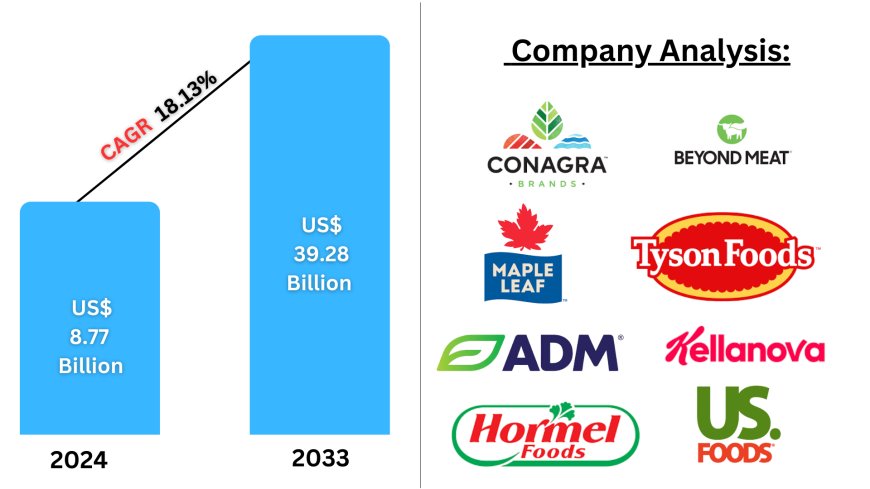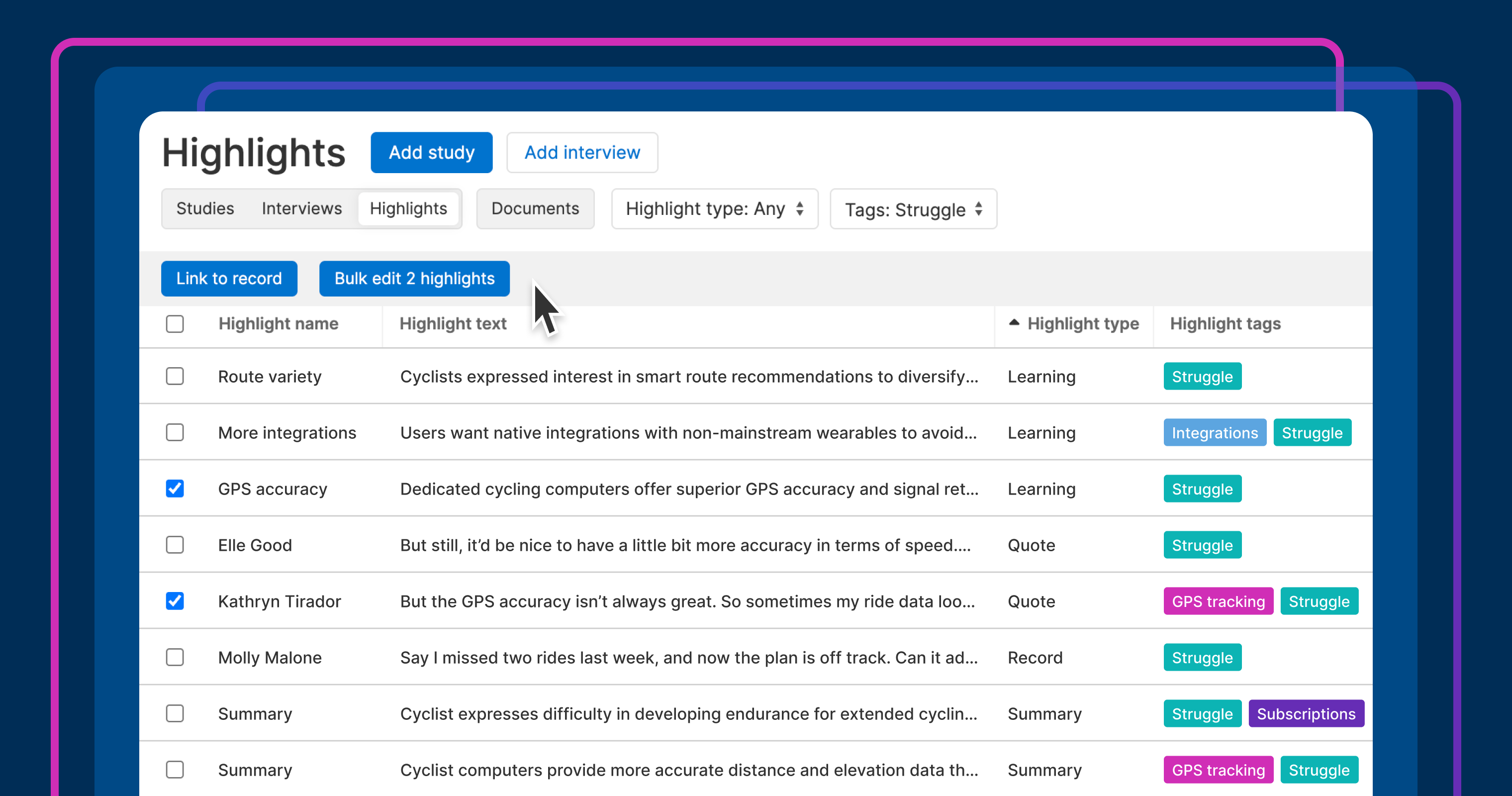Plant-Based Meat Market Insights 2025-2033| Growth & Opportunity Analysis
The global plant-based meat market is experiencing unprecedented growth and is expected to reach a value of USD 39.28 billion by 2033, growing from USD 8.77 billion in 2024, with a compound annual growth rate (CAGR) of 18.12% from 2025 to 2033.

Global Plant-Based Meat Market Analysis, Trends, and Forecast 2025–2033
Market Overview
The global plant-based meat market is experiencing unprecedented growth and is expected to reach a value of USD 39.28 billion by 2033, growing from USD 8.77 billion in 2024, with a compound annual growth rate (CAGR) of 18.12% from 2025 to 2033. This surge is driven by several factors, including growing consumer demand for sustainable, health-conscious, and ethically sourced alternatives to traditional animal-based meat. The shift towards plant-based diets is gaining traction as consumers become increasingly aware of the environmental, ethical, and health benefits of plant-based proteins. As the demand for meat alternatives continues to grow worldwide, it is transforming the food industry, bringing plant-based meat into mainstream supermarkets, fast food chains, and restaurants.
Key Segments of the Plant-Based Meat Market
Source Segmentation
- Soy: A primary ingredient for plant-based meat products due to its rich protein content.
- Pea: Pea protein is gaining popularity for its versatility and neutral flavor profile, which allows it to be used in a wide range of products.
- Wheat: Wheat gluten is used for its ability to mimic the texture and mouthfeel of meat, making it an essential component in many plant-based meat alternatives.
- Others: Includes ingredients such as rice, potatoes, and lentils.
Meat Type Segmentation
- Chicken: A leading product type, with plant-based chicken alternatives becoming increasingly available in the market.
- Pork: The growing interest in plant-based pork is evident, driven by consumer preferences for healthier and sustainable alternatives.
- Beef: Plant-based beef is one of the most popular alternatives, especially in the form of burgers and other ground meat products.
- Fish: As awareness of the environmental impact of overfishing rises, plant-based fish products are gaining popularity, particularly in the form of fillets and seafood alternatives.
- Others: Includes plant-based options for lamb, turkey, and other meats.
Product Type Segmentation
- Burger Patties: One of the most widely consumed plant-based meat products, known for their versatility and ability to closely mimic the taste and texture of traditional burgers.
- Sausages: An increasingly popular product in plant-based offerings, with flavors that rival their traditional counterparts.
- Nuggets and Strips: Plant-based chicken nuggets and strips are gaining popularity, particularly in fast food and casual dining.
- Ground Meat: This category includes plant-based alternatives to ground beef, used in various dishes like tacos, spaghetti, and chili.
- Meatballs: Plant-based meatballs are gaining traction due to their appeal in Italian and Mediterranean cuisines.
- Others: Includes steaks, fillets, and specialty products.
Distribution Channel Segmentation
- Food Retail: This segment includes supermarkets, hypermarkets, and other retail outlets offering plant-based meat products to consumers.
- Food Service: Restaurants, fast food chains, and cafes that are increasingly incorporating plant-based meat into their menus.
- E-Commerce: Online platforms are playing a crucial role in the distribution of plant-based meat products, particularly for niche and premium offerings.
Storage Segmentation
- Refrigerated Plant-Based Meat: Typically found in fresh sections of retail stores, offering convenience for consumers looking for fresh alternatives.
- Frozen Plant-Based Meat: This category includes frozen products that have a longer shelf life and cater to both retail and foodservice segments.
- Shelf Stable Plant-Based Meat: Includes products that can be stored at room temperature, often in cans or vacuum-sealed packaging.
Market Growth Drivers
1. Rising Demand for Sustainable and Ethical Products
The global meat industry contributes significantly to environmental degradation, with animal agriculture being responsible for 15% of global greenhouse gas emissions. As awareness of the environmental impact of traditional meat production grows, consumers are increasingly seeking plant-based alternatives that offer a more sustainable and eco-friendly solution. Plant-based meats are not only more resource-efficient in terms of land, water, and feed usage, but they also have a much lower carbon footprint compared to animal-based products.
New Publish Reports:
· GCC Liquid Biopsy Market Size and Share Analysis - Growth Trends and Forecast Report 2025-2033
· GCC Foodservice Market Size and Share Analysis - Growth Trends and Forecast Report 2025-2033
· GCC Hydroponics Market Size and Share Analysis - Growth Trends and Forecast Report 2025-2033
2. Health-Conscious Consumer Trends
Consumers are increasingly aware of the health risks associated with high cholesterol, saturated fats, and processed meats. Plant-based meats offer a healthier alternative, typically lower in saturated fats and cholesterol-free. This shift in consumer preferences is driving the demand for plant-based meat alternatives, particularly among individuals looking to improve their overall health or reduce their risk of chronic diseases like heart disease and diabetes.
3. Technological Advancements in Food Production
Improvements in food technology have enabled manufacturers to enhance the taste, texture, and nutritional profile of plant-based meats, making them more appealing to a broader range of consumers, including non-vegetarians. Innovations such as lab-grown plant-based meats, which replicate the look and taste of traditional meats more closely, are expected to continue driving market growth.
Challenges Facing the Plant-Based Meat Market
1. High Production Costs
The cost of producing plant-based meat is one of the primary challenges facing the market. High-quality plant proteins, specialty flavorings, and advanced production techniques such as fermentation drive up production costs. These higher costs are reflected in the price of plant-based meat products, making them less affordable for many consumers. While economies of scale are expected to reduce costs over time, affordability remains a significant barrier to widespread adoption.
2. Consumer Perception and Acceptance
Despite the growing popularity of plant-based meat, some consumers still exhibit reluctance to switch from traditional meat to plant-based alternatives. Skepticism about taste, texture, and the nutritional value of plant-based products is a barrier to adoption, particularly among lifelong meat-eaters. Overcoming these perceptions through better marketing, education, and continuous product innovation will be key to the long-term success of the plant-based meat industry.
Regional Insights
1. North America
The United States is the largest market for plant-based meat, driven by increasing consumer awareness of sustainability, health, and animal welfare. Leading companies like Beyond Meat and Impossible Foods have successfully introduced plant-based products to mainstream consumers, expanding availability through retail and foodservice channels.
2. Europe
The United Kingdom is a significant player in Europe’s plant-based meat market, with consumers increasingly opting for plant-based products due to health, ethical, and environmental concerns. Other European countries such as Germany, France, and Spain are also seeing strong growth in the demand for plant-based meat alternatives.
3. Asia Pacific
Asia-Pacific markets, particularly China and India, are witnessing a shift towards plant-based diets, driven by health concerns and environmental issues related to meat production. China, with its large population and growing middle class, presents significant market opportunities for plant-based meat companies.
4. Latin America
Brazil, with its large agricultural industry, is becoming an essential market for plant-based meat alternatives in South America. Companies are innovating to offer plant-based products suited to local tastes, making these alternatives increasingly popular.
5. Middle East and Africa
The plant-based meat market is gaining traction in the Middle East and Africa, particularly in countries like South Africa and the UAE. These regions are witnessing a rise in health-conscious consumers and increasing awareness about environmental sustainability, which is driving demand for plant-based alternatives.
Top Companies in the Plant-Based Meat Market
- Beyond Meat
- Impossible Foods
- Conagra Brands
- Maple Leaf Foods Inc.
- Tyson Foods Inc.
- Kellanavo
- Archer Daniels Midland
- US Foods Holding
- Hormel Foods Corporation
Conclusion
The plant-based meat market is poised for robust growth in the coming years, driven by shifts in consumer behavior, technological advancements in food production, and an increasing focus on sustainability. As consumer demand for healthier, more ethical, and environmentally friendly alternatives to traditional meat products continues to rise, plant-based meat companies will need to innovate and address challenges such as production costs and consumer acceptance to maintain momentum. With strong market potential across various regions and product categories, the global plant-based meat market presents significant opportunities for both existing players and new entrants in the food industry.
Press Release
Global Plant-Based Meat Market to Reach USD 39.28 Billion by 2033, Fuelled by Growing Demand for Sustainable and Health-Conscious Alternatives
May 9, 2025 – Noida, India – The global plant-based meat market is expected to grow at a compound annual growth rate (CAGR) of 18.12%, reaching USD 39.28 billion by 2033. This growth is driven by consumer demand for ethical, health-conscious, and sustainable food alternatives, as well as advancements in food technology and innovations in plant-based product offerings.
Plant-based meats, including burgers, sausages, and meatballs, have gained widespread popularity as consumers become more aware of the environmental impact of traditional meat production. Leading companies such as Beyond Meat and Impossible Foods are at the forefront of the market, offering a wide range of plant-based products to cater to the rising demand.
The market is expected to continue its expansion across various regions, with significant growth in North America, Europe, and Asia-Pacific. The increasing focus on reducing meat consumption due to health and environmental concerns, along with technological advancements in food production, is expected to drive the market further.
For more information on the global plant-based meat market, please visit ResearchAndMarkets.com.
About the Company:
Renub Research is a Market Research and Consulting Company. We have more than 15 years of experience especially in international Business-to-Business Researches, Surveys and Consulting. We provide a wide range of business research solutions that helps companies in making better business decisions. We partner with clients in all sectors and regions to identify their highest-value opportunities, address their most critical challenges, and transform their businesses. Our wide clientele comprises major players in Healthcare, Travel and Tourism, Food Beverages, Power Energy, Information Technology, Telecom Internet, Chemical, Logistics Automotive, Consumer Goods Retail, Building, and Construction, Agriculture. Our core team is comprised of experienced people holding graduate, postgraduate, and Ph.D. degrees in Finance, Marketing, Human Resource, Bio-Technology, Medicine, Information Technology, Environmental Science, and many more.
Media Contact:
Company Name: Renub Research
Contact Person: Rajat Gupta, Marketing Manager
Phone No: +91-120-421-9822 (IND) | +1-478-202-3244 (USA)
Email: mailto:rajat@renub.com




































































































![Building A Digital PR Strategy: 10 Essential Steps for Beginners [With Examples]](https://buzzsumo.com/wp-content/uploads/2023/09/Building-A-Digital-PR-Strategy-10-Essential-Steps-for-Beginners-With-Examples-bblog-masthead.jpg)

















































